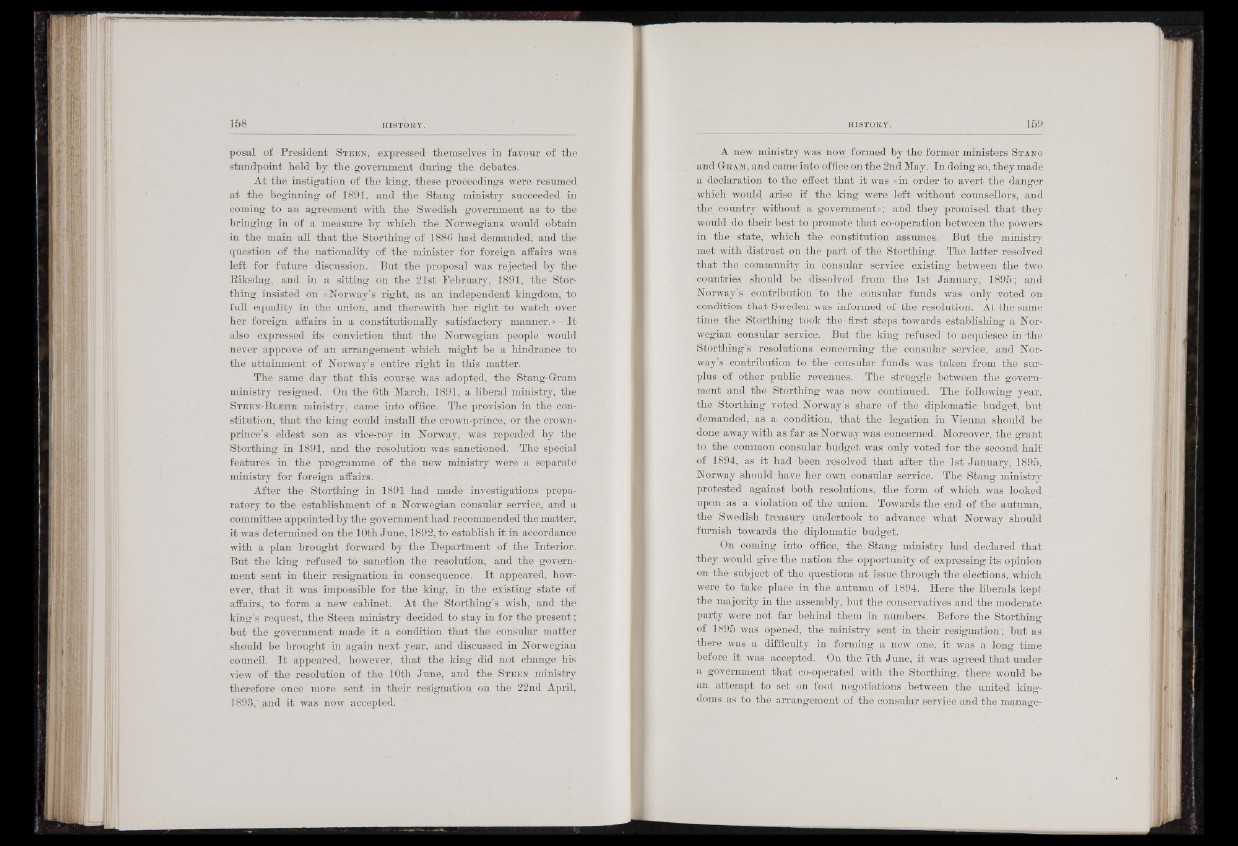
posai of President Steen, expressed themselves in favonr of tlie
standpoint held by the government during the debates.
At the instigation of the king, these proceedings were resumed
at the beginning of 1891, and the Stang ministry succeeded in
coming to an agreement with the Swedish government as to the
bringing in of a measure by which the Norwegians would obtain
in the main all that the Storthing of 1886 had demanded, and the
question of the nationality of the minister for foreign affairs was
left for future discussion. But the proposal was rejected by the
Riksdag, and in a sitting on the 21st February, 1891, the Storthing
insisted on «Norway’s right, as an independent kingdom, to
full equality in the union, and therewith her right to watch over
her foreign affairs in a constitutionally satisfactory manner. » It
also expressed its conviction that the Norwegian people would
never approve of an arrangement which might be a hindrance to
the attainment of Norway’s entire right in this matter.
The same day that this course was adopted, the Stang-Gram
ministry resigned. On the 6th March, 1891, a liberal ministry, the
S t b e n -Bl e h r ministry, came into office. The provision in the constitution,
that the king could install the crown-prince, or the crown-
prince’s eldest son as vice-roy in Norway, was repealed by the
Storthing in 1891, and the resolution was sanctioned. The special
features in the programme of the new ministry were a separate
ministry for foreign affairs.
After the Storthing in 1891 had made investigations preparatory
to the establishment of a Norwegian consular service, and a
committee appointed by the government had recommended the matter,
it was determined on the 10th June, 1892, to establish it in accordance
with a plan brought forward by the Department of thè Interior.
But the king refused to sanction the resolution; and the government
sent in their resignation in consequence. I t appeared, however,
that it was impossible for the king, in the existing state of
affairs, to form a new cabinet. At the Storthing’s wish, and the
king’s request, the Steen ministry decided to Stay in for the present ;
but the government made it a condition that the consular matter
should be brought in again next year, and discussed in Norwegian
council. I t appeared, however, that the king did hot change his
view of the resolution of the 10th June, and the S t e e n ministry
therefore once more sent in their resignation on the 22nd April,
1893,'and it was now accepted. '
A new ministry was now formed by the former ministers S tang
and G ram, and came into office on the 2nd May. In doing so, they made
a declaration to the effect that it was «in order to avert the danger
which would arise if the king were left without counsellors, and
the country without a government»; and they promised that they
would do their best to.promote that co-operation between the powers
in the state, which the constitution assumes. But the ministry
met with distrust on the part of the Storthing. The latter resolved
that the community in consular service existing between the two
countries should be dissolved from the 1st January, 1895; and
Norway’s contribution‘to the consular funds was only voted on
condition that Sweden was informed of the resolution. At the same
time the Storthing took th e ‘first steps towards establishing a Norwegian
consular service. But the king refused to acquiesce in-the
Storthing’s resolutions_concerning the consular service, and Norway’s
-contribution to the consular funds was taken from the surplus
of other public revenues. The struggle between the government
and the Storthing was now continued. The following year,
the Storthing voted Norway’s share o f the diplomatic budget, but
demanded, as a condition, that the legation in Vienna should be
done away with as far as Norway was concerned. Moreover, the grant
to the common consular budget was only voted for the second half
of 1894, as it had been resolved that after the 1st January, 1895,
Norway should have her own consular service. The Stang ministry
protested against both resolutions, the form of which was looked
upon as a violation of the union. Towards the end of the autumn,
the Swedish treasury undertook to advance what Norway should
furnish towards the diplomatic budget.
On coming into office, the Stang ministry had declared that
they would give the nation the opportunity of expressing its opinion
on the-subject of the questions at issue through the elections, which
were to take place in the autumn of 1894. Here the liberals kept
the majority in the assembly, but the conservatives and the moderate
party were not far behind them in numbers. Before the Storthing
of 1895 was opened, the ministry sent in their resignation; but as
there was a difficulty in forming a new one, it was a long time
before it was accepted. On the 7th June, it was agreed that under
a government that co-operated with the Storthing, there would be
an attempt to set on foot negotiations between the united kingdoms
as to the arrangement of the consular service and the manage